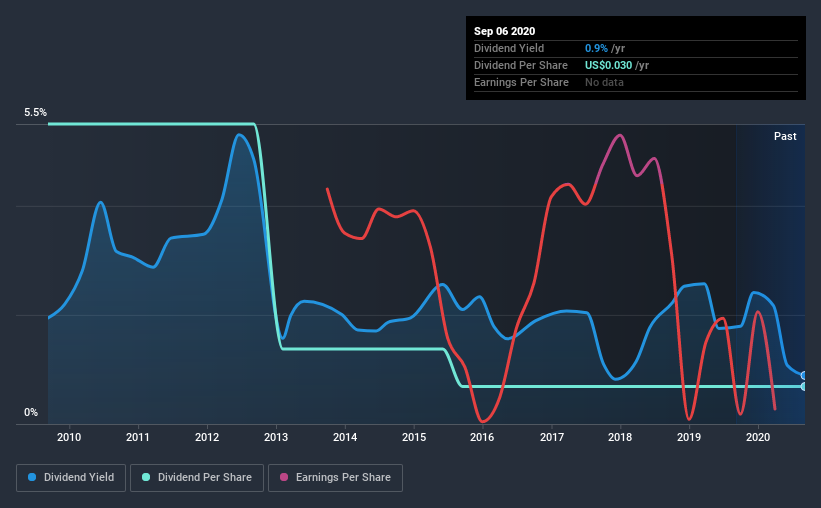Don't Buy U.S. Global Investors, Inc. (NASDAQ:GROW) For Its Next Dividend Without Doing These Checks

U.S. Global Investors, Inc. (NASDAQ:GROW) stock is about to trade ex-dividend in 4 days. You can purchase shares before the 11th of September in order to receive the dividend, which the company will pay on the 28th of September.
U.S. Global Investors's next dividend payment will be US$0.0025 per share, and in the last 12 months, the company paid a total of US$0.03 per share. Based on the last year's worth of payments, U.S. Global Investors stock has a trailing yield of around 0.9% on the current share price of $3.37. Dividends are an important source of income to many shareholders, but the health of the business is crucial to maintaining those dividends. So we need to investigate whether U.S. Global Investors can afford its dividend, and if the dividend could grow.
Check out our latest analysis for U.S. Global Investors
Dividends are typically paid out of company income, so if a company pays out more than it earned, its dividend is usually at a higher risk of being cut. U.S. Global Investors reported a loss after tax last year, which means it's paying a dividend despite being unprofitable. While this might be a one-off event, this is unlikely to be sustainable in the long term.
Click here to see how much of its profit U.S. Global Investors paid out over the last 12 months.
Have Earnings And Dividends Been Growing?
Businesses with shrinking earnings are tricky from a dividend perspective. If earnings decline and the company is forced to cut its dividend, investors could watch the value of their investment go up in smoke. U.S. Global Investors was unprofitable last year and, unfortunately, the general trend suggests its earnings have been in decline over the last five years, making us wonder if the dividend is sustainable at all.
Another key way to measure a company's dividend prospects is by measuring its historical rate of dividend growth. U.S. Global Investors's dividend payments per share have declined at 19% per year on average over the past 10 years, which is uninspiring. While it's not great that earnings and dividends per share have fallen in recent years, we're encouraged by the fact that management has trimmed the dividend rather than risk over-committing the company in a risky attempt to maintain yields to shareholders.
We update our analysis on U.S. Global Investors every 24 hours, so you can always get the latest insights on its financial health, here.
To Sum It Up
Has U.S. Global Investors got what it takes to maintain its dividend payments? It's hard to get past the idea of U.S. Global Investors paying a dividend despite reporting a loss over the past year - especially when the general trend in its earnings also looks to be negative. These characteristics don't generally lead to outstanding dividend performance, and investors may not be happy with the results of owning this stock for its dividend.
So if you're still interested in U.S. Global Investors despite it's poor dividend qualities, you should be well informed on some of the risks facing this stock. Every company has risks, and we've spotted 4 warning signs for U.S. Global Investors (of which 1 is a bit concerning!) you should know about.
A common investment mistake is buying the first interesting stock you see. Here you can find a list of promising dividend stocks with a greater than 2% yield and an upcoming dividend.
This article by Simply Wall St is general in nature. It does not constitute a recommendation to buy or sell any stock, and does not take account of your objectives, or your financial situation. We aim to bring you long-term focused analysis driven by fundamental data. Note that our analysis may not factor in the latest price-sensitive company announcements or qualitative material. Simply Wall St has no position in any stocks mentioned.
Have feedback on this article? Concerned about the content? Get in touch with us directly. Alternatively, email editorial-team@simplywallst.com.

 Yahoo Finance
Yahoo Finance 
